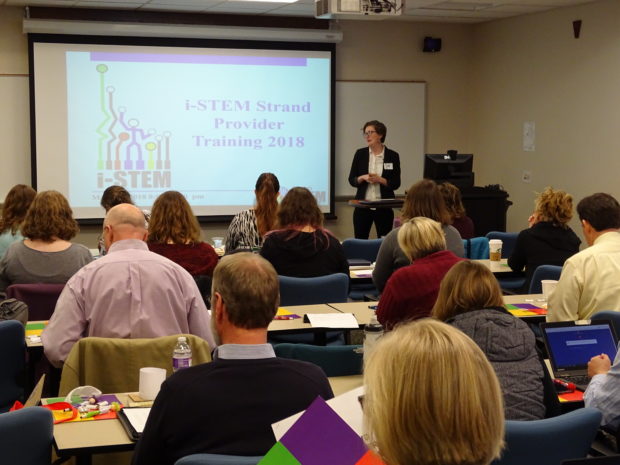She’s a research scientist who studied extinct mammals and plants. She’s a Ph.D. with expert knowledge on coding and biology, and has been published over a dozen times. She’s also a huge fan of science, technology, engineering and math.
For all those reasons and more, Kaitlin Maguire is quite comfortable in the role of leading Idaho’s STEM Action Center.
As interim head of Idaho’s STEM Action Center, Maguire is relying her professional background to bring more science, technology, engineering and math into Idaho’s classrooms.
“I’m a lifelong learner,” she said.
Maguire’s education and work history
Maguire, named the center’s interim director on Nov. 30, doesn’t come from the education field, but instead spent years studying science, biology and the history of the world.
Maguire loves all things science and took as many biology courses in college as she could manage.
“I’ve always been a curious person,” Maguire said.
Her favorite class was historical geology, which led to an internship at the Smithsonian National Museum of Natural History where she worked with the dinosaur curator.
Maguire majored in biology at George Washington University, then earned her master’s degree in geology at Ohio University and her Ph.D. in ecology and evolutionary biology at the University of California, Berkeley.
Maguire started her professional career as a research scientist for the U.S. Geological Survey, where she studied extinct mammals and plants and their effects on the environment. An avid hiker, Maguire has traveled to countries such as Mongolia and Tanzania for research. The Vermont native landed in Idaho because she loves the outdoors.
Maguire also has a background in coding, something she taught herself in graduate school to help analyze data and create statistical models.
“I love the challenge and rewards that coding provides,” she said.
Turning from researcher to teacher
Maguire enjoys mentoring students, in part, because she did not have a role model in science when she was young, outside of a “wonderful” biology teacher. Maguire said children are naturally curious and lose that curiosity as they get older, something she hopes to combat.
And Maguire said her background in science is a great starting spot, calling paleontology a “gateway” to STEM.
“Every kid goes through that dinosaur phase,” she said.
Maguire was hired by the center in November 2017 to oversee the i-STEM Professional Development program. In her three years, Maguire said she was happy to be able to host STEM workshops throughout Idaho, including at multiple colleges.
“I enjoyed working with educators and learning about the amazing STEM that’s going on around the state,” she said.
Maguire’s newer project is starting the Idaho STEM Ecosystem, a network of partners around the state.
The Idaho STEM Ecosystem looks at every learner (which includes students and adults) from multiple angles. Students spend their days in classrooms, but also have after-school activities and they work at home. Maguire said when you look at education like this, a lot more adults would be classified as educators.
“It’s going to play a huge role moving forward for us,” she said. “A lot of people influence students throughout the day.”

Former STEM Action Center Executive Director Angela Hemingway left to join T-Mobile as the company’s national education advisor. Hemingway had been in her position at the STEM Action Center since 2015 (the year it was established by the Legislature) and hired Maguire.
“Dr. Kaitlin Maguire is STEMazing!!” Hemingway wrote in an email. “She is multi-talented, a visionary who is a deep strategic thinker, and a strong leader for student access and equity in STEM education.”
With the COVID-19 pandemic affecting education — most metro-area schools are online-only and many of Idaho’s colleges are online — Maguire said the STEM Action Center is supporting educators as much as possible.
“There is a big concern that students are losing the opportunity for hands-on STEM,” Maguire said. The STEM Action Center is working on providing more materials to educators through a lending library so students can take them home or safely use them in a classroom setting.
“STEM is more important than ever before,” Maguire said. “STEM has helped us get out of this pandemic and it has helped us get through this pandemic.”
